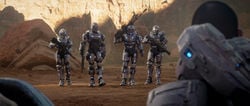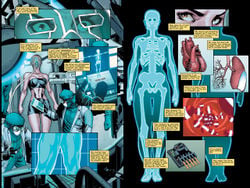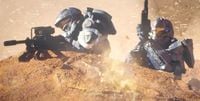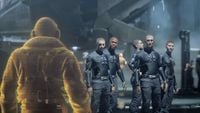SPARTAN-IV program: Difference between revisions
From Halopedia, the Halo wiki
No edit summary |
m (→Equipment) |
||
| Line 229: | Line 229: | ||
*A series of additional augmentations were included in the earliest, prototypical phase of the program. While these enhancements would have made the Spartans significantly stronger and more resistant to injury, they proved to have an unacceptable casualty rate, killing or crippling nine of the ten initial candidates while leaving the sole survivor mentally unstable.<ref name="HI3"/> | *A series of additional augmentations were included in the earliest, prototypical phase of the program. While these enhancements would have made the Spartans significantly stronger and more resistant to injury, they proved to have an unacceptable casualty rate, killing or crippling nine of the ten initial candidates while leaving the sole survivor mentally unstable.<ref name="HI3"/> | ||
SPARTAN-IVs must follow a rigid set of guidelines to maintain their physical fitness and health. These include undergoing regular medical examinations, including physiological scans, reviews and treatment before and after each mission. A SPARTAN-IV is expected to at optimum capacity with a minimum of two-and-one-half hours of sleep per a 48-hour cycle; for [[cryo-chamber|cryosleep]], standard UNSC practices apply. They are also instructed to follow standard UNSC [[physical training]] practices. Due to their augmented physiques, however, they are provided their own, custom-built gym equipment. Official meals are specifically prepared to meet the caloric, nutritional and medicinal needs of each individual Spartan. These personal needs are measured based on activity data recorded by the Spartan's individual physiometer. Ancillary medications may be provided to ensure the Spartan's well-being and to reduce risk of potential implant rejections.<ref name="packet"/> | SPARTAN-IVs must follow a rigid set of guidelines to maintain their physical fitness and health. These include undergoing regular medical examinations, including physiological scans, reviews and treatment before and after each mission. A SPARTAN-IV is expected to perform at optimum capacity with a minimum of two-and-one-half hours of sleep per a 48-hour cycle; for [[cryo-chamber|cryosleep]], standard UNSC practices apply. They are also instructed to follow standard UNSC [[physical training]] practices. Due to their augmented physiques, however, they are provided their own, custom-built gym equipment. Official meals are specifically prepared to meet the caloric, nutritional and medicinal needs of each individual Spartan. These personal needs are measured based on activity data recorded by the Spartan's individual physiometer. Ancillary medications may be provided to ensure the Spartan's well-being and to reduce risk of potential implant rejections.<ref name="packet"/> | ||
{{Clear}} | {{Clear}} | ||
==Gallery== | ==Gallery== | ||
<gallery> | <gallery> | ||
Revision as of 10:49, May 4, 2014
Template:Newcontent Template:Infobox Military Unit
- "There won't be any program; not like the Spartan-Twos, anyway or the Spartan-Threes, if I can help it. We're back to using consenting adults now, like we did in Project Orion."
- — Admiral Margaret Parangosky, CINCONI[1]
The SPARTAN-IV program is the fourth iteration of the SPARTAN supersoldier projects. Like the original ORION Project, the SPARTAN-IV program utilizes consenting adult volunteers selected from the other branches of the United Nations Space Command, in contrast to the previous two programs which used children as candidates.[1] Recruits are drawn from both career military veterans and young soldiers who show considerable promise.[2] The SPARTAN-IVs serve in the indepent Spartan branch, which was created for the oversight of their operations.[3]
Background
At some point prior to the instatement of the current SPARTAN-IV program, elements within the Office of Naval Intelligence's Section III authorized a prototypical phase without approval from High Command. This incarnation was intended to produce supersoldiers whose physical prowess rendered MJOLNIR armor redundant. However, only one of the ten volunteer test subjects survived the augmentation process. The survivor, Ilsa Zane, was driven mad by the experience and was folded into ONI. Despite the project's failure, Zane was considered the original SPARTAN-IV.[4]
The program as it now exists was commissioned as a result of the success of the preceding SPARTAN-II and SPARTAN-III projects. The SPARTAN-IV project was conceived by Lieutenant Commander Musa-096, a former SPARTAN-II candidate who was crippled by the augmentation process. Despite his grudge toward Dr. Catherine Halsey, Musa recognized the crucial role of the Spartans in defending humanity and the continued importance of the supersoldiers in the aftermath of the Human-Covenant War.[5] The proposal was approved by Admiral Margaret Parangosky, then Commander-in-Chief of the Office of Naval Intelligence, and the new program was initiated under her orders. Parangosky initially planned to have SPARTAN-III lead Colonel James Ackerson heading the program, with SPARTAN-II project lead Dr. Catherine Halsey to be reassigned as Ackerson's subordinate.[6] Ackerson was killed following the Battle of Mare Erythraeum and Halsey was arrested after returning from Onyx, though ONI continued the program without the two,[7] with the help of Musa and Jun-A266, a former SPARTAN-III Alpha Company member.[5]
In addition to the significant numbers of adult volunteers which make up the majority of the SPARTAN-IVs, the SPARTAN-IIs and SPARTAN-IIIs who survived the Human-Covenant War were offered to be integrated into the SPARTAN-IV program.[8] The first class of SPARTAN-IVs went active in early 2553.[5] Hundreds of SPARTAN-IVs are assigned to the UNSC Infinity, the most powerful warship ever constructed by mankind.[7] They train with one another in simulations known as "War Games" on the Infinity's state-of-the art combat deck (a training chamber that is capable of replicating environments), in order to constantly stay battle-ready.[9]
The SPARTAN-IVs serve in a dedicated branch of the UNSC known simply as "Spartan", whereas their forebears operated within other chains of command.[3] Unlike their predecessors, the SPARTAN-IVs are identified by their surnames rather than numeric tags (due to their volunteered enlistment rather than kidnapping/conscription). Unusually, the SPARTAN-IVs have shown a great deal of solidarity, especially impressive given the short time they have served together. Many of them have adopted colloquialisms first used by the SPARTAN-IIs, such as "Alpha Bravo" for "Alien Bastard". Psychologists assert that this camaraderie and cohesiveness will help distinguish the SPARTAN-IVs, and the Spartan branch as a whole, from the other UNSC branches.[2]
List of SPARTAN-IV units and personnel
| Unit | Status | Personnel | Notes |
|---|---|---|---|
| UNSC Infinity Spartan command | Active |
|
|
| Gypsy Company | Active | At least two Spartan-IVs[12] | Also contains UNSC Marine Corps personnel.[12] |
| Mountain Squad | KIA |
|
A science attache unit. Killed during the Requiem campaign after being shot down in Two Giants.[13] |
| Fireteam Apex | Active | unknown | Participated in the Requiem campaign[14] |
| Fireteam Avalanche | Active | unknown | Participated in the Requiem campaign[15] |
| Fireteam Bailey | KIA |
|
Killed in action during the Battle of Ealen IV |
| Fireteam Castle | KIA | Killed in action after being shot down during the Requiem campaign[17] | |
| Fireteam Crimson | Active | Four Spartan-IVs | Participated in the Requiem campaign[14] |
| Fireteam Colossus | Active | unknown | |
| Fireteam Domino | Active | unknown | Participated in the Requiem campaign[14] |
| Fireteam Fenrir | Active | unknown | |
| Fireteam Forest | Active | Aided Crimson in acquiring replace power supply for the Harvester[18] | |
| Fireteam Horse | Active | unknown | Participated in the Requiem campaign[14] |
| Fireteam Ivy | Active | unknown | Participated in the Requiem campaign[14] |
| Fireteam Jackknife | Disbanded |
|
Participated in the Battle of Ealen IV; betrayed by Vladimir Scruggs |
| Fireteam Kodiak | Active | unknown | Participated in the Requiem campaign[19] |
| Fireteam Lancer | Active | Participated in the Requiem campaign[14] | |
| Fireteam Majestic | Active[14] | Participated in the Requiem campaign and the Battle of Ealen IV | |
| Fireteam Rhino | Active | unknown | Participated in the Requiem campaign[14] |
| Fireteam Shadow | Active | Participated in the Requiem campaign[14] | |
| Fireteam Sword | Active | unknown | Participated in the Requiem campaign[14] |
| Fireteam Switchback | Active |
|
Captured during a mission to destroy a Harvester during the Requiem campaign[21] Later rescued by Fireteam Crimson and Fireteam Lancer.[22] |
| Fireteam Sydney | Active | unknown | Participated in the Requiem campaign[14] |
| Fireteam Talon | Active | unknown | Participated in the Requiem campaign[14] |
| Fireteam Tower | Active | unknown | Participated in the Requiem campaign[14] |
| Fireteam Wolf | Active | unknown | Participated in the Requiem campaign[14] |
- Unknown
- Bethany Kossup
- Edward Davis - KIA during the Battle of Draetheus V
- Gamma Company
- Joel Thomas
- Jun-A266
- Yeong-hao Holst
- Several SPARTAN-IV killed by Gek 'Lhar
Discharged
Ten SPARTAN-IV candidates were discharged from the prototypical phase of the program after being crippled or killed by the augmentations.[23]
- Ilsa Zane - Discharged after her augmentations left her mentally unstable. Assigned to the Office of Naval Intelligence, but subsequently escaped and defected to the Insurrection.[23]
Equipment

MJOLNIR armor
- Main article: MJOLNIR Powered Assault Armor (GEN2)
SPARTAN-IVs are equipped with the MJOLNIR [GEN2], the second-generation version of the MJOLNIR Powered Assault Armor.[9] An assortment of armor configurations are available for all new Spartans per UNSC Regulation 3A-950, and Spartans are capable of customizing their individual armor set with modular components from a wide range of special-purpose variants, based on their personal preferences, specialization and mission requirements. Selecting variants for purely cosmetic reasons is discouraged. It is strictly forbidden for Spartans to attempt to repair or modify their armor; all armor maintenance is only to be performed by qualified Class-61 technicians in dedicated facilities.[24] Unlike the uniformly green coloration of the SPARTAN-IIs' first-generation MJOLNIR armor, SPARTAN-IV armor comes in a profusion of distinct color patterns, with the members of specific teams often sporting a consistent coloration.[25] However, any customization of the armor color must be in accordance to UNSC Equipment Code 20.00.62.[24]
The standard-issue armor set for Spartan-IVs—at least those assigned to UNSC Infinity—is the Recruit variant,[26] colored gray and orange.[27][25]
Augmentation procedures
Like the augmentations performed for the SPARTAN-IIs and the improved procedures utilized in the subsequent SPARTAN-III program, the SPARTAN-IVs underwent a series of procedures to enhance their physical capabilities and to wear MJOLNIR armor.[3] Unlike the Spartan-III augmentations, which consisted solely of chemical injections, the SPARTAN-IV augmentations combine chemicals and surgical procedures like those pioneered by Dr. Catherine Halsey in the SPARTAN-II program. The technology used in the two preceding SPARTAN programs necessitated that the candidates meet exceedingly strict genetic qualifications as well as the application of the enhancements on preteens, to avoid the catastrophic failure rates produced by the augmentation of adult subjects in the ORION Project.[28] By the time of the initiation of the SPARTAN-IV program, the technology had advanced to the point that adults could be augmented seemingly without major risk.[29]
The SPARTAN-IV augmentation procedures take three weeks to perform, with recovery and subsequent training usually lasting several months.[24] While the enhancements have not been described in detail, they incorporate technologies originating from prior SPARTAN programs as well as completely new additions:
- Bones are infused with a substance that makes them nearly unbreakable.
- Muscles are injected with a material that allows them to work harder without breaking the subject's skeleton.
- Corneal implants are provided to improve night vision.
- Heart is implanted with a synthetic weave which significantly increases its capacity to pump blood, allegedly allowing a SPARTAN-IV to "outrun a horse".
- Lungs are lined with a polymer that enhances oxygen intake and allows them to process toxins or foreign gas mixtures, potentially allowing a SPARTAN-IV to breathe methane for around an hour.
- Intestinal bacteria are altered to enable the digestive system to absorb more nutrients out of food.
- Pancreas is replaced by a completely new, vat-grown organ.
- Blood is altered to allow for faster clotting.
- Subject is given several implants to help medical teams keep tabs on them.[29]
- A series of additional augmentations were included in the earliest, prototypical phase of the program. While these enhancements would have made the Spartans significantly stronger and more resistant to injury, they proved to have an unacceptable casualty rate, killing or crippling nine of the ten initial candidates while leaving the sole survivor mentally unstable.[23]
SPARTAN-IVs must follow a rigid set of guidelines to maintain their physical fitness and health. These include undergoing regular medical examinations, including physiological scans, reviews and treatment before and after each mission. A SPARTAN-IV is expected to perform at optimum capacity with a minimum of two-and-one-half hours of sleep per a 48-hour cycle; for cryosleep, standard UNSC practices apply. They are also instructed to follow standard UNSC physical training practices. Due to their augmented physiques, however, they are provided their own, custom-built gym equipment. Official meals are specifically prepared to meet the caloric, nutritional and medicinal needs of each individual Spartan. These personal needs are measured based on activity data recorded by the Spartan's individual physiometer. Ancillary medications may be provided to ensure the Spartan's well-being and to reduce risk of potential implant rejections.[24]
Gallery
A SPARTAN-IV from Making Halo 4: First Look.
Gabriel Thorne receiving his Recruit helmet.
Spartans Madsen and Grant from Fireteam Majestic.
Fireteam Majestic observing the AI Roland's avatar.
List of appearances
- Halo: Glasslands Template:First mentioned
- Halo: The Thursday War (Mentioned only)
- Halo 4 (First appearance)
- Halo: Spartan Assault
- Halo: Initiation
- Halo: Escalation
Sources
- ^ a b Halo: Glasslands, page 434
- ^ a b Eleventh Hour reports, part 3
- ^ a b c Halo 4 Official Site: Story
- ^ Halo: Escalation
- ^ a b c Halo: Initiation, Issue 1
- ^ Halo: Glasslands, page 147
- ^ a b Halo: Glasslands, page 422
- ^ Halo: Glasslands, page 435
- ^ a b Gameinformer (May 2012), pages 46-47
- ^ Cite error: Invalid
<ref>tag; no text was provided for refs namedpanel - ^ a b YouTube - Halo 4: Spartan Ops Gameplay
- ^ a b Halo 4, level Reclaimer
- ^ a b c d Spartan Ops, S1E3 Spartan Mountain
- ^ a b c d e f g h i j k l m n o p q r s Halo 4 Limited Edition — War Games Session Summary
- ^ Spartan Ops, Episode 7, Chapter 2: "Home Field"
- ^ Spartan Ops, S1E1 Departure
- ^ Spartan Ops, S1E4 Didact's Hand: Chapter 1: Hairy Call
- ^ Spartan Ops, Episode 10, Chapter 3: "Seize the Power"
- ^ Spartan Ops, Episode 7, Chapter 4: "The Guns of Infinity"
- ^ MightyApe.co.nz: Halo 4 Limited Edition screenshots
- ^ YouTube - Halo 4: Spartan Ops - Episode 6 Chapter 4 Developer Commentary
- ^ Spartan Ops, S1E8 Expendable: Chapter 3: Lancer
- ^ a b c Halo: Initiation, Issue 3
- ^ a b c d Halo 4 Limited Edition - Infinity Briefing Packet
- ^ a b Spartan Ops
- ^ Halo 4, Recruit armor description
- ^ Halo 4 campaign level Infinity
- ^ Dr. Halsey's personal journal
- ^ a b Halo: Initiation, Issue #2
| |||||||||||||||||








